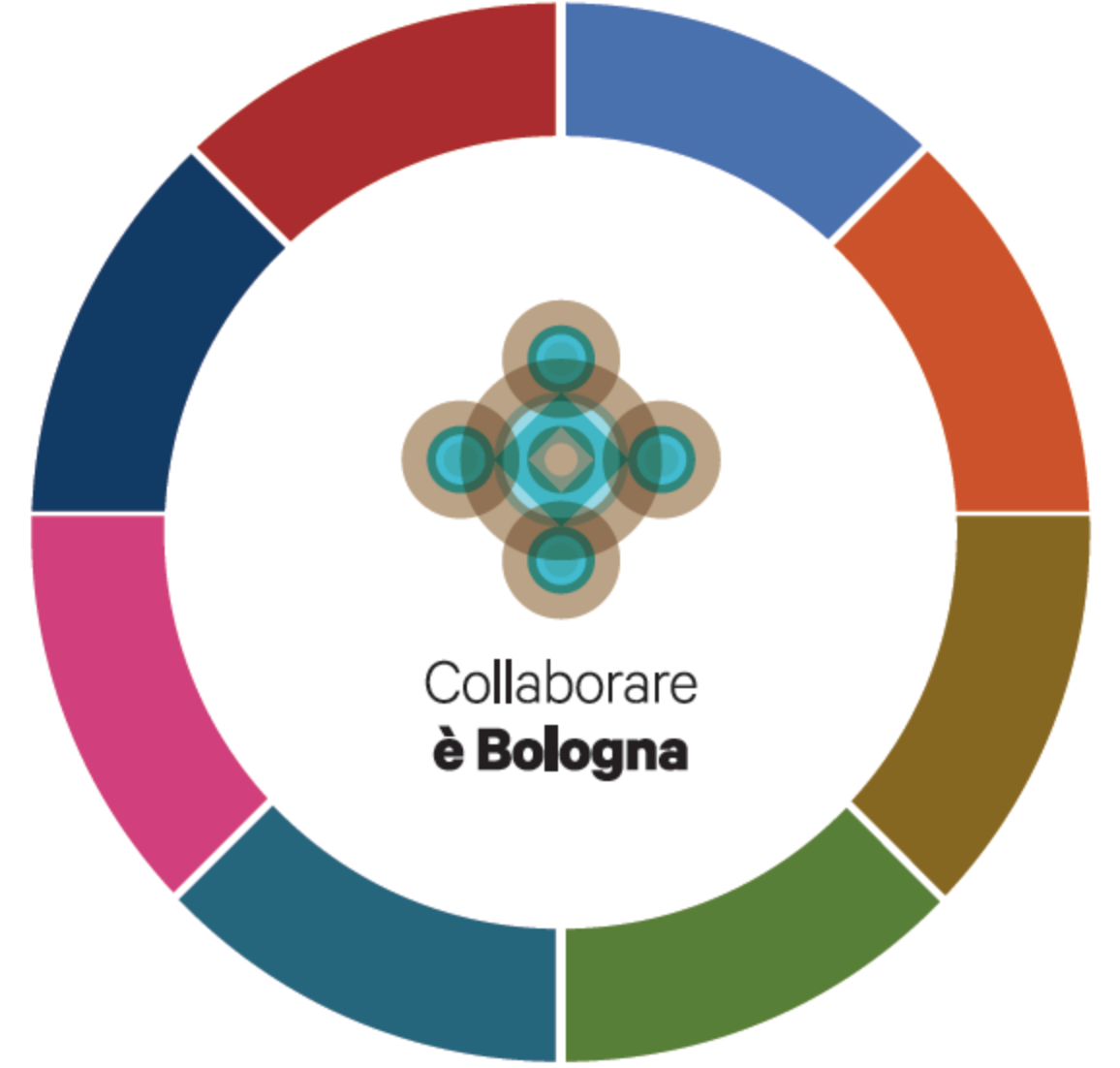Short Summary
The Bologna Regulation was crafted to legally enable the city government to host public collaboration for urban commons. It is a formal program of the City of Bologna that invites ordinary citizens and neighborhoods to invent their own urban commons, with the government's active assistance. The project is a deliberate attempt to move beyond top-down, expert-driven bureaucratic control to a more flexible, needs-based system of bottom-up initiative and innovation.Location: Bologna, Italy
Key players include Roman law Professor Christian Iaione, Georgetown University Professor of Urban Law and Policy Sheila Foster and the academic legal center LabGov.

Logo.
source ![]()
Profile
The Bologna Regulation is based on Article 118, paragraph 4 of the Italian Constitution (source). Its central regulatory tool is the "collaboration agreement," signed by citizens and the city, which establishes the object or care, and the rules and conditions of collaboration among any group of citizens and the local government, or other actors.
The Bologna Regulation differs from conventional bureaucratic/legal approaches in trying to enable the agency and creativity of citizens. As legal scholars Sheila Foster and Christian Iaione point out, the Regulation seeks to foster "experimentalist, adaptive, iterative governance and legal tools" so that citizens can enter into “co-design processes" (source) for producing common goods in cities.
The Bologna Regulation regards the city as a collaborative social ecosystem, not simply as an inventory of resources to be administered by politicians and bureaucratic experts. City residents are viewed as resourceful, imaginative agents in their own right, and citizen initiative and collaboration as under-leveraged energies that—with suitable government assistance—could be recognized and given space to work. In this framework, the government is a hosting infrastructure for countless self-organized commons.
The public-commons partnership is a classic case of co-creating generative change. In this case, however, a key participant is the state. This introduces an unequal power relationship and distorts classic bottom-up commoning. But if the state players are sincere and motivated, it is nonetheless a way of pooling and sharing diverse talents and resources for shared benefit. Any returns here are likely to be services or access to infrastructure, whose benefits are only loosely conjoined through giving and taking. Commons developed under the Bologna Regulation tend to rely upon distributed structures with a modest centralized coordination.
“Commons aren’t just something we protect, but also what we invent,” declared Bologna Deputy Mayor Matteo Lepore. (source)
YOUTUBE elCk2B0x4Lk This 2015 conference inspired by the Bologna Regulation "brought together leading scholars, researchers, policymakers, practitioners and social innovators to take stock of the developments in the interdisciplinary study of the urban commons and related questions of urban governance."
Governance
As a new type of public-commons partnership, the Bologna Regulation seeks to break down some of the traditional barriers between government and the citizenry by facilitating collaborative governance. The goal is also to provide a citizen-friendly vehicle for people to care about their city and work to make it better.The commons that arise from the Bologna Regulation are not typically commons in that the state is the official host, legal arbiter, and technical facilitator of what transpires in the citizen-led commons. That said, the legal regime does provide significant room for collective citizen initiative and responsibility.
At a more general level, the program helps bring together the citizens of the city; cultivate trust and transparency that may not be present in bureaucratic decision making; and take citizens seriously as sources of good ideas and commitment.
Projects
In 2015, Bologna Deputy Mayor Matteo Lepore described some of the collaborative projects that the city has undertaken with citizen groups. As reported by Jay Walljasper, these included:- Neighborhood regeneration projects, which he emphasized are “not on behalf of citizens but with citizens, who are a great source of energy, talent, resources, capabilities and ideas”
- An experiment wherein restaurants and bars work directly with neighbors to set rules for their businesses and cooperate on regenerating the community
- A program to draw upon parents’ ideas and skills to improve kindergartens
- A civic crowdfunding prototype to support projects that the city cannot wholly fund, such as restoration of Bologna’s 24 miles of arched porticoes over sidewalks
- An ambitious program of urban gardens
- Creation of digital platforms to support commons projects of all varieties
The projects fall into three general categories:
- Living together (collaborative services)
- Growing together (co-ventures)
- Working together (co-production)
Friends & Partners
LabGov (LABboratory for the GOVernance of the Commons), which has many quasi-separate outposts at various universities and law schools (e.g. Sheila Foster is at Georgetown University in the U.S.), and comprises:Finances
The city government provides financial and technical support to citizen groups as needed.Origin Story
When some residents of Bologna sought to get a bench erected in their neighborhood, they discovered that the city government had no recognized process for dealing with citizen initiatives of this nature. The Regulation was drafted to address this need, and released in 2014. The Regulation "provides that the City periodically advertise the list of spaces, buildings or digital infrastructures which could be target of actions of care and regeneration, specifying goals to be pursued through collaboration with active citizens." (source)See Also
- Public commons partnership
- Co-City Movement — the Bologna Regulation was the first gambit in this area of trying to integrate commoning with city bureaucracies and politics
Sources
- "Regulation on Collaboration Between Citizens and the City for the Care and Regeneration of Urban Commons"
- Christian Iaione, "The Right to the Co-City" (2017)
- Jay Walljasper, "The City as a Commons: From Flint to Italy" (2016)
- Sheila R. Foster and Christian Iaione, "The City as a Commons" (2016)
- Commons Transition Primer, Case Study on Bologna Regulation
- Shareable, "How Bologna is regenerating the urban commons" (2018)